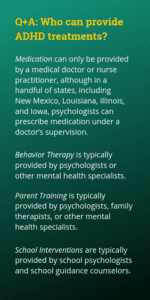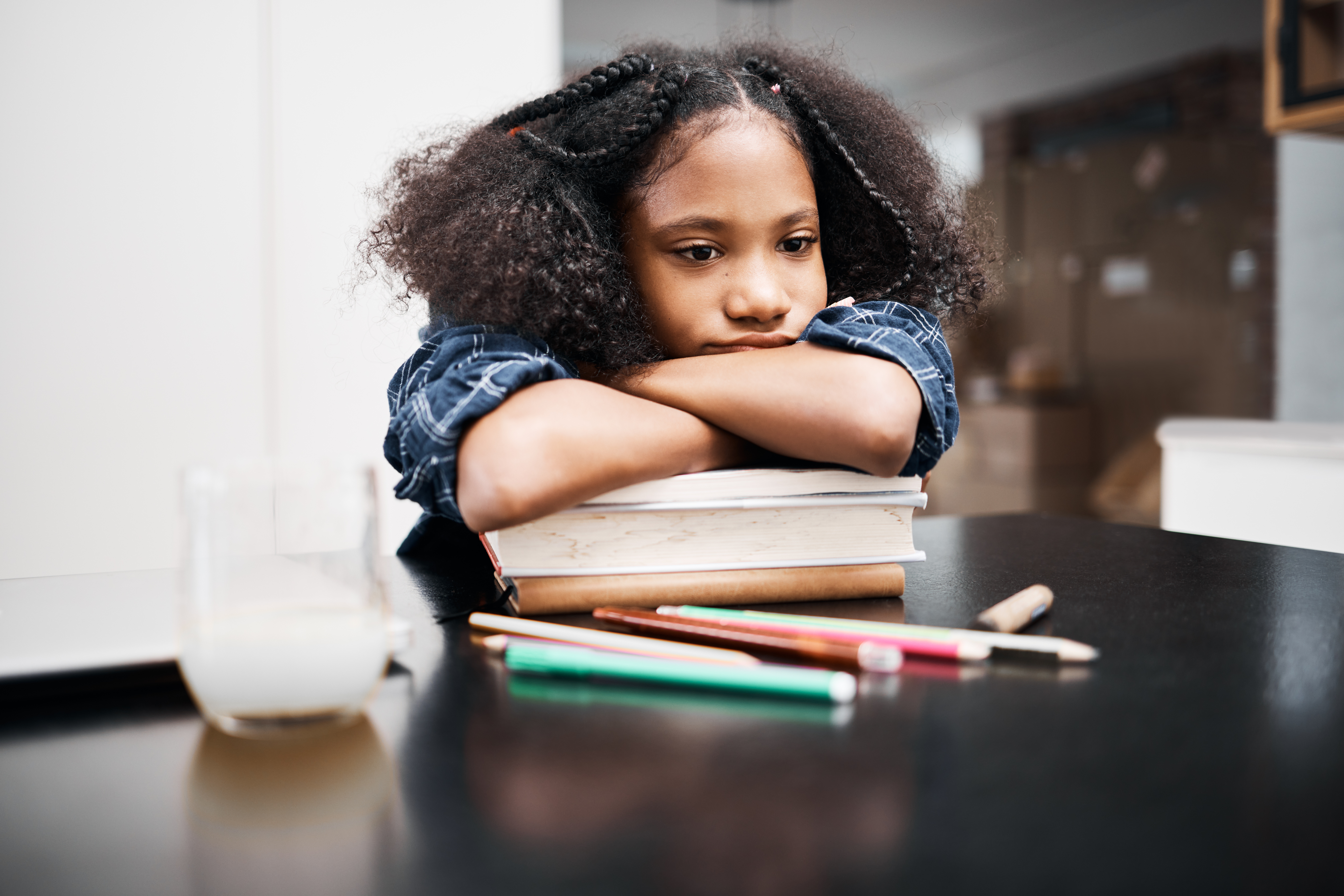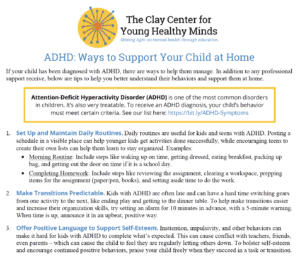What are the best treatments for ADHD?
October Is National Attention Deficit Hyperactivity Disorder (ADHD) Awareness Month. ADHD is a medical condition that affects how the brain works. It can take many forms, in that people with ADHD may be challenged with inattention, hyperactivity and impulsivity. Learn more about ADHD from Ellen Braaten, PhD, and executive director of the Learning and Emotional Assessment Program (LEAP) at Massachusetts General Hospital.
This article was originally published by The Clay Center for Young Healthy Minds at Massachusetts General Hospital.
Question: What are the best treatments for ADHD?
Dr. Braaten’s Answer:
ADHD is a disorder (Attention Deficit Hyperactivity Disorder) that affects the brain and behaviors. There is no known cure, but there are many good options to help kids manage. For children older than age 6, the American Academy of Pediatrics recommends both behavior therapy and medication as good options, preferably together if symptoms are moderate to severe. For younger children, behavior therapy is recommended as the first line of treatment. There isn’t just one “right way” when it comes to treatments for ADHD in your child. Instead, families should work with everyone involved in their child’s life – teachers, pediatricians, therapists, to take advantage of the best options available.
Medication
There are a number of evidence-based, tested treatments for ADHD in children, but many parents struggle with the most well-researched of them all – medication. Literally hundreds of studies have been done in children and the overall results show that medication, when properly and carefully prescribed, is the most effective treatment for managing symptoms of ADHD – especially when paired with other treatments like behavior therapy. Stimulant medications are the most commonly used medications to treat the symptoms of ADHD, but several other medications are also sometimes used, like certain antidepressants and antihypertensives.
There are three FDA-approved classes of stimulants for use in children with ADHD:
- amphetamines (such as Adderall and Dexedrine)
- methylphenidates (such as Ritalin, Focalin, Concerta and Metadate)
- magnesium pemoline (Cylert)
Of the drugs mentioned, Ritalin is the most commonly prescribed. One other popularly-prescribed drug, Strattera, is a non-stimulant medication developed to treat ADHD.
Medication has been found to be very helpful to about 8 in 10 kids with ADHD who take it. The benefits include that they:
- have improved attention
- are more persistent at tasks (particularly those they find less interesting)
- show less motor activity and restlessness
- are more attentive to academics in the classroom
- are less impulsive
- are more productive.

Medication can also have a positive impact on a child’s social behavior and their relationship with parents because there tends to be less conflict.
For all its benefits, it’s important to remember that stimulants do not address all of the challenges that children with ADHD have. They won’t necessarily make your child more organized or help them plan out their term paper in advance. Also, about 2 in 10 show little response to the medication (or cannot tolerate side effects, which may include sleeping problems, anxiety, and poor appetite). Some parents simply don’t want to use medication.
Luckily, there are other important interventions like behavior therapy, parent training, and school-based interventions. Some psychologists and researchers have even argued that these other interventions should be implemented before trying medication, and they should of course remain in place, as needed, once a child is on medication. This is an issue to explore with your doctor as each child and family has different needs. The treatment choice may vary over time depending on the child’s needs.
Behavior Therapy
Behavior therapy focuses on using skills and strategies to help children control their own behavior – including self-control and self-esteem. It has been shown to effectively treat symptoms of ADHD when used in the home, classroom, or even summer camp settings. In each of these settings, the parent or teacher and child set realistic goals, determine a reward system, carefully monitor the child’s performance and reward the child for meeting his or her behavior goals. Poor behavior may be punished through losing privileges or having a “time out.” Psychologists are frequently involved in establishing behavior therapy approaches in both home and school settings.
Parent Training
Parent training applies behavioral approaches to family functioning. It doesn’t just target the child’s behaviors but also parenting skills, such as teaching parents how to use effective language and establish appropriate rules in the home, how to effectively use punishment (such as time outs and other appropriate consequences), and how to effectively reward positive behavior.
School Interventions
Many studies have demonstrated the benefits of behavioral procedures within the classroom environment. These interventions can take the form of academic interventions (e.g., tutoring in specific subjects or teaching organizational or study skills), or classroom interventions, like the posting of classroom schedules and rules, point systems for positive behaviors, or daily reports cards where teachers send home a daily note about the child’s behavior, which parents can then reinforce at home. Research has also indicated that peer tutoring and computer-assisted instruction can increase attentiveness and decrease disruptiveness.
Combination Treatments
A couple of very important studies have shown that for some groups of children, a combination of behavior therapy along with medication is more effective than medication alone. In addition, lower doses of medication are needed to achieve the same results when it’s combined with behavior therapy compared to medication alone. And the importance of good parenting skills should not be underestimated as a part of effective treatment, as parents play a major role in their children’s development.
Supportive Treatments
Supportive treatments include interventions like family therapy, individual supportive therapy for the child, and ADHD support groups. While there is limited evidence that these treatments eliminate or decrease symptoms of ADHD, they can help parents cope with their child’s symptoms.
- Becoming involved in a support group can help parents feel they are not alone and provides a forum to obtain information from others such as referrals to qualified professionals, how to help teachers and school administrators understand their child, and how to “handle” the embarrassment of having a child who may be disruptive, and the general stress and frustrations that can be involved in parenting an ADHD child.
- Individual counseling for a child can help them cope with the inevitable stress and self-defeating patterns of behavior that can come with ADHD. It can help children identify their strengths and learn adaptive ways of coping with their symptoms.
- Family therapy can help the entire family cope with the blame and anger that can occur when a child has ADHD. Siblings may feel neglected because their parents are “always” managing the child with ADHD, and the child with ADHD may feel overly criticized, which can set up a negative family dynamic. This type of therapy can help all of the family members develop new skills and attitudes as well as a shared vision for their family’s future.

